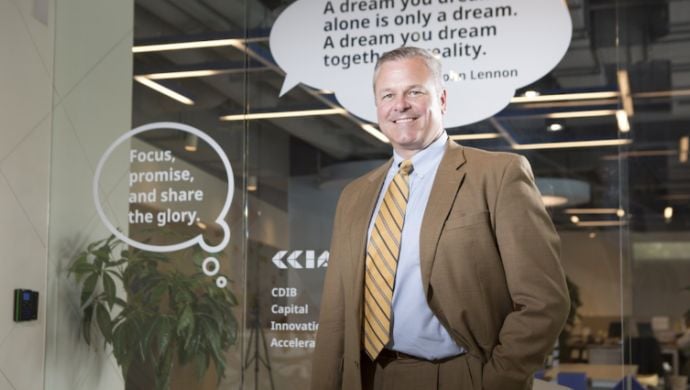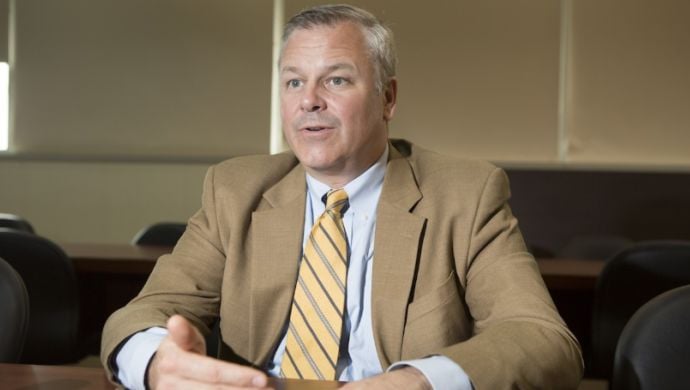MassChallenge is one of the largest startup accelerator in the US, and it is fostering partnership with the Taiwan government

MassChallenge, a large American startup accelerator, is expanding its reach into Taiwan and its president visited this month to explain.
Business Next/Meet talked to the MassChallenge president, Mike LaRhette in person on May 4 about its plans to work with the Taiwanese government. LaRhette also shared bits of advice for Taiwanese entrepreneurs.
LaRhette has worked for MassChallenge since its inception a decade ago as an advisor for its growth. The Boston-based, not-for-profit accelerator has helped 1,000 startups over the past eight years, and it’s expanding programmes overseas.

MassChallenge president, Mike LaRhette. Image Credit: 周書羽
The president previously worked as a principal with Collective Next, a design firm based in Boston. He had graduated from Boston College with a degree in economics and psychology. LaRhette holds a master’s degree from the same school in developmental studies and psychology.
The highlights from the interview with LaRhette:
Q: I hear that the Taiwan cabinet’s minister without portfolio Wu Tsung-Tsong will sign an agreement with MassChallenge Boston in early June. Tell us a bit about what you’re hoping to do?
A: We had a great meeting with a Minister Wu at the Executive Yuan this morning (May 4), talking about how the government plays a significant role in fostering entrepreneurship activity and the startup ecosystem. We had a lot of great ideas on how recent momentum can be carried forward. Also, some new initiatives were discussed at the meeting, as well.
The minister is coming to Boston the first week in June. So we’ll be signing an agreement that launches that programme “Bridge to MassChallenge Taiwan”. It’s a new programme for Taiwan.
We’ve delivered the Bridge to MassChallenge program in places like Mexico, Australia, Colombia, Morocco, Poland, Spain, and France. It’s the first time we’re doing it in Taiwan. This is our first programme of this size in this (Asian Pacific) region.
Also Read: Taiwan wants to challenge Silicon Valley and Shenzhen, but still has a long way to go
Q: What are some of the other programmes or initiatives in which Taiwanese startups can get involved?
A: We’re going to have a boot camp experience in September in Taipei. For the September experience, Boston resources will coming here to Taiwan.
We will bring over a couple staff members from MassChallenges as well as three or four mentors from Boston to help Taiwanese startups understand how to play in global markets. We will select those mentors based on what we think the startups may need to understand more.
So maybe more about expanding into global markets. We’re also looking at mentors with particular industry expertise. (The September programme) will lead into what may be a bigger scale program for 2019, where we start to do more work here in Taiwan and then bring more startups to Boston. We’re building a staging for a bigger programme next year.
Q: Does it mean that the Bridge to MassChallenge Taiwan programme in June and the forthcoming start bootcamp programme in September might lead to establishing a MassChallenge Taipei in the future?
A: When we do a Bridge programme, that can really inform both sides about what’s the best model that we are going to forward.
Is the startup ecosystem strong enough to support? And is there a need for a MassChallenge programme as an office or as an accelerator within country and, or, does the market tell us that you’re not really looking for an in-country accelerator as much as you’re looking for soft-landings in other parts of the world?
What we might discover over the next six months is that you’re not looking for startups to be accelerated here but you’re looking for a pipeline of activity that involves you accelerating and doing accelerator programs in our Boston programme, or sending startups to Israel or to Switzerland for that matter.
So really, it’s an investigation on our part. It may not lead to MassChallenge Taipei based on the same model that we have in Boston or the MassChallenge Israel we have. It may look like something different. We’re very open to understanding we’re fit here.
Also Read: Taiwan government, US NGO co-sponsor contest for Asian startups
Q: MassChallenge advertises itself as the most startup-friendly accelerator, taking zero equity from startups. How does it work?
A: When we started we had about 30 per cent funding from our state agencies and state governments, that number is less than 10 per cent now. Government funding helps in our early days and our corporate funding grew. The corporate funding is about 70 per cent of our funding in Boston.
In other locations we have a little heavier government involvement right now. For example, in Mexico and in Jerusalem, Israel, we have about 40 per cent of funding from the government. Because they’re still in the early phases in their programme.
Q: What’s the secret sauce for MassChallenge to become one of the world’s most successful accelerators?
A: The reason people come to work for MassChallenge is the mission. Being a mission-driven not-for-profit organisation, we have a very clear mission that everyone understands.
It’s carefully worded and it goes like this: We believe in a creative and inspired society in which everyone recognises that they can define their future, and is empowered to maximise their impact. People who work for us and people who come to accelerate with us, they know they’re part of something that’s bigger than themselves.
I believe the secret sauce is that we’re mission driven, that we don’t take any equity, and we’re really built for the startups. We’re the biggest accelerator on the planet. We have this massive scale on the global bases that if you need something, we will get that resources for you.
Q: What is the most interesting or most surprising trends you see in digital health technology?
(MassChallenge sub-specialises in digital healthcare. Its PULSE@MassChallenge programme specifically promotes medical entrepreneurship.)
A: There are generally three trends, or three shifts we’ve seen so far. First, we’ve seen a trend in customised healthcare such as customisation of medicine towards individual users. The second major shift is we’re seeing a lot more hardware devices and wearables coming out.
Thirdly, we’re seeing more predictive analytics coming out, including applications built on top of artificial intelligence and big data. A lot of our startups generally fit in those latter two categories.
—
The article Q&A with the President of Startup Accelerator MassChallenge on its Taiwan Ambitions first appeared on Business Next.
The post Q&A with the President of Startup Accelerator MassChallenge on its Taiwan ambitions appeared first on e27.